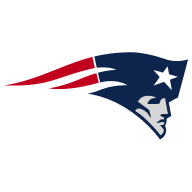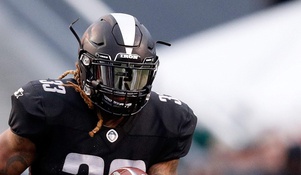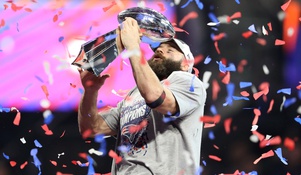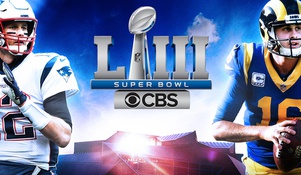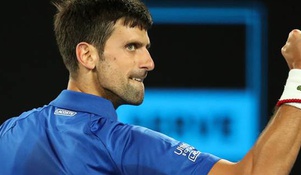Two Roads: A Prelude To Super Bowl LIII
For the sixth time in Super Bowl history, two franchises will face each other a second time on the game's grandest stage when the Los Angeles Rams and New England Patriots meet in Atlanta for Super Bowl LIII. This particular rematch is unique as one of the principles, the Rams, will be representing a different city, as they were in St Louis when they last played in the NFL's championship game. The relocation of the Rams is one of the many changes that have occurred since these teams faced one another in Super Bowl XXXVI to conclude the 2001 season. What our focus is on here is the 18 year journey that the Patriots and Rams have each travelled to reach this point. As we look to write the final chapter of the 2018 season, it is a remarkable path that both conference champions took to get here.
Patriot Reign
It's funny how the years pass. How we view today has a tendency to rewrite our past as to fit a particular narrative, regardless of what walk of life it hails. The NFL is no different, as the Patriots have been accurately referred to as the league's greatest dynasty, given their acquired accolades over a span of nearly two decades. However, revisionist history does serve as a measure of injustice on how the Patriots became a generational powerhouse. First and foremost, it was never easy. In 2001, franchise quarterback Drew Bledsoe suffered a punctured lung against the New York Jets ,knocking him out of the lineup for a month. In his place trots out second year backup Tom Brady, a sixth round draft pick in 2000 and fought to impress to retain a roster spot for his sophomore season. While Brady didn't look especially impressive (young QB's thrown into the fire rarely do) second year head coach Bill Belichick did the unthinkable: he kept Brady as his starter and relegated his veteran signal caller to the bench once Bledsoe was medically cleared to play. But something was working. The Patriots would see a six game swing from their campaign in 2000 (from 5-11 to 11-5), winning the AFC East and earned a first round bye in the playoffs. The Patriots would earn postseason victories in the Divisional Playoffs (over the Oakland Raiders in the infamous Tuck Rule game) and the AFC Championship (an upset over the hosting Pittsburgh Steelers) en route to their third Super Bowl berth in franchise history. They would face the Rams, who shocked the world a scant two years prior with their own incredible turnaround season to win Super Bowl XXXIV. Now, the Rams were the big favorites and the Pats were the scrappy underdogs. Once Adam Vinatieri hit a 43 yard game winning field goal to win their first Lombardi Trophy, David toppled Goliath for the first time since Super Bowl XXXII (at least in terms of the sports books' point spreads). While some saw New England's sudden rise to prominence as the beginning of something more due to their salary structure, many considered the Patriots' run out of nowhere as a one off, an anomaly of the traditional NFL hierarchy. This opinion was emboldened thanks to New England's 9-7 three way tie in the AFC East that left them out in the cold thanks to being on the wrong end of tiebreakers. It wasn't until 2003 when the Pats made the football world stand up and take notice. After getting blown out by the Buffalo Bills on Opening Day 31-0 and falling to the Washington Redskins in Week 4, the Patriots would make history by winning. A lot. That loss at the hands of the 'Skins would be their last in a calendar year, riding a 21 game win streak through the rest of the 2003 season that would collect their second Super Bowl ring and fuel a second consecutive 14-2 regular season that would culminate in repeating as Super Bowl champions, and since this would be New England's third title in four years, it cemented their legacy as a dynasty. With Brady improving as both a passer and a leader, and Belichick appearing to be at the top of his game, this should have been viewed as the start of something bigger. However, at the conclusion of 2004, Belichick would lose both his coordinators to head coaching opportunities elsewhere. A dropoff in performance was expected. But it was a negligible drop, not a precipitous one, as the Patriots would continue winning their division in 2005 and 2006, but would fall in the AFC playoffs to Denver and Indianapolis, respectively. Then 2007 came. After defeating the New York Jets in Week 1, Jets head coach (and former Patriots assistant) Eric Mangini leveled accusations of spying on his former employer, which would become the Spygate scandal that would come to a specious conclusion the next offeseason with the Patriots being fined and stripped of draft picks. But for that season, the questions about the team's legitimacy as a champion was season long bulletin board material. The Pats would not just win games; they would destroy their opposition. In 11 of 16 regular season games, the Patriots' margin of victory would be at least by 17 points. They would ride that show of force to the NFL's first undefeated regular season in 36 years and post the league's first 18 win season ever after triumphs over the Jacksonville Jaguars and San Diego Chargers to return to the Super Bowl stage. The Patriots' bid to become the second modern era NFL team to go undefeated fell short, as the New York Giants, New England's Week 17 opponent to clinch that undefeated regular season, gained revenge as they would stun the football world by defeating the Pats 17-14 in Super Bowl XLII. For most any other franchise, a loss of such historic proportions often initiates a death spiral in which they could never recover. And in 2008, it had the makings of one, as Brady was lost after Week 1 due to a knee injury and the Pats would be the second team in history to post an 11-5 record and miss the playoffs. This would only the third time under Belichick that they would not play in the postseason. But starting in 2009, the Patriots would begin a current streak of winning the AFC East (10), setting another record. Two years later, in 2011, New England would start another historic streak by playing in the AFC Championship game for a now record eight consecutive seasons. Over that time, they would lose another Super Bowl to the Giants (XLVI this time), play kingmaker to the Baltimore Ravens, win a fourth Super Bowl by denying the Seattle Seahawks their bid to repeat as champions, play kingmaker again (this time for the Denver Broncos), defeat the Atlanta Falcons in Super Bowl LI with an epic 25 point comeback and winning in the game's first ever overtime, and losing a highly competitive tilt against the Philadelphia Eagles last year in Super Bowl LII. The accomplishments of the New England Patriots in the new millennium are mind-numbingly amazing. Since Brady and Belichick have become a quarterback & head coach combination, the resumé is unparalleled: 16 division titles (with ten consecutive wins that is currently active), 13 conference championship appearances (with a current streak of eight straight), 9 AFC Championships (including a current 3 year run), & five Super Bowl titles... and trying to win a sixth to match the Pittsburgh Steelers for the record of such titles for a franchise. Because of their dominance of the current time and their perch as a Super Bowl contender for the better part of 18 years, appreciation of all the Patriots have done may not be appreciated until all the principles of that success have either retired or have moved on from the organization. It's hard to fathom any franchise in the future being able to eclipse what these Patriots have done, but good luck to any club that wants to try. Regardless of the outcome, this will be yet another chapter in the legacy of this special team. But rest assured, they are living proof that winning never gets old.
From Silence of the Rams to West Coast Resurgence
Super Bowl XXXVI was expected to be the coronation of a new NFL dynasty. With MVP caliber players on offense with a complementary defense and an anointed genius as head coach, big things were seen in store... for the St. Louis Rams. Quarterback Kurt Warner had a meteoric rise from struggling young journeyman to NFL MVP and Super Bowl champion. Running back Marshall Faulk was a multidimensional threat that was difficult to game plan for, especially with the receiving corps that can break for big plays on a routine basis, with Isaac Bruce, Torry Holt, and Az-Zahir Hakim equally dangerous to score on a moment's notice. Head coach Mike Martz, the Rams' offensive coordinator in their championship campaign, was still crafting the offense into what is now known as the Greatest Show On Turf. Add to this a retooled defense that reversed their performance from 2000, and it was considered a foregone conclusion that the Rams would win their second Lombardi Trophy in three years and were primed to become the NFL's new dynasty of the new millennium. But the New England Patriots have something to say about that with their upset victory in New Orleans. That monumental loss would serve as a catalyst as to the decline of the team, but it wasn't clearly evident at the time. Warner would fall apart in 2002, performing abysmally (in relation to his overall performance over the prior three years) early in the season until a hand injury would sideline him. This would lead to the emergence of Marc Bulger, like Warner, was an unheralded, undrafted signal caller that gained Martz's trust through a tough 7-9 campaign. In 2003, Warner would start the season opener against the New York Giants, but would be permanently benched in favor of Bulger, then released in the 2004 off-season. That season, the installation of Bulger would look inspired, as the Rams would go 12-4 and gain home field advantage throughout the playoffs. But in the Edward Jones Dome, they would suffer what would be a crippling double overtime loss to the Carolina Panthers as wide receiver Steve Smith would catch a Jake Delhomme pass and turn it into a 63 yard touchdown and a 29-23 result. This would be the Rams last winning season for 14 years. The stars on offense would decay and wither away, shutting down the Greatest Show On Turf. 2004 would be the team's last playoff berth until 2017, where the Rams would defeat the Seattle Seahawks before falling to the Atlanta Falcons 47-17 in the divisional round. In that time, Martz would be forced to step away from the sidelines due to heart health issues, and his successors would struggle. Compounding these would be the passing of owner Georgia Frontiere in January 2008. The unsettled situation at the ownership level, as her children had no desire to keep the club, would reverberate down to the product on the field. From 2007 to 2009, the Rams would go 6-42 (.143). Minority owner Stan Kroenke would gain majority status in 2010, then later becoming sole owner. His stewardship would witness a modest improvement on the field, but he would begin a string of litigation against the city of Saint Louis and the state of Missouri that would be the harbinger to the team relocating back to Los Angeles, their previous host city from 1946 to 1994. When the Rams received the green light to move, they were loathed in the Show Me State due to a scorched earth campaign to curry favor with the other NFL owners for relocation and were irrelevant on the field by virtue of their drought of non-winning seasons, then at 12 straight. And their first season back in the City of Angels, the 4-12 record would suggest more of the same lethargy was to come. During that 2016 season, head coach Jeff Fisher was fired, with special teams coordinator John Fassel finishing up. That ensuing offseason, Rams brass made a curious decision for their next head coach. They hired Washington Redskins offensive coordinator Sean McVay to fill that spot. At 31 years of age, he was easily the youngest coach in the pro ranks. He did have a decade long resumé as a pro coach, but only three years at a coordinator's position. Some circles believed that McVay is just too young to be handed such a mantle of leadership. His directive was clear. McVay's raison d'etre was to turn 2016 #1 overall draft pick, QB Jared Goff, into a franchise player and leader. The most important hire on McVay's new staff was defensive coordinator Wade Phillips, the 69 year old guru of the 3-4 defense that is universally respected in league circles, has head coaching experience (which meant he knows how not to step on his boss' toes), and still has the ability to maximize the talent of players in his stead. With the wealth of defensive experience that Phillips possessed, that would free up McVay to focus on rebuilding the offense hone Goff's natural talent. This would translate into an eight game positive swing in 2017, posting an 11-5 record, winning the NFC West and earning a home playoff game. Not bad for a franchise that just about everyone wrote off as dead. However, the Rams would fall to a postseason experienced club in the Falcons to suffer a quick exit from the Super Bowl tournament. For 2018, general manager Les Snead went balls out, acquiring top shelf talent to put the Rams over the top: WR Brandin Cooks, DT Ndamukong Suh, CB's Aqib Talib & Marcus Peters, then trading for LB Dante Fowler at the trade deadline in season. This led to a 13-3 regular season record, the #2 seed in the NFC playoffs, victories over the Dallas Cowboys and New Orleans Saints to win the George S. Halas Trophy for a third time in franchise history (albeit in controversial fashion regarding the result over the latter), and a date with the New England Patriots on Super Bowl Sunday.
Our combatants in Super Bowl LIII have taken unique journeys to reach this point. One has redefined the definition of greatness within the realm of professional football, while the other has taken a long and winding road back to prominence. One is seeing the sunset in the distance, while another is enjoying a new morning. Will it be the Patriots adding yet another trophy to the loaded case, or will the Lombardi Trophy head to California for the first time in two decades? Will age overcome youth, both on the field and in the game plan? We will find out come Super Bowl Sunday.


